Sample emails to your thesis supervisor
A good thesis requires good communication between you and your thesis supervisor. This includes emails! Yet, even a simple email can lead to stress and overthinking. If you struggle to communicate with your thesis supervisor via email, have a look at six sample emails for inspiration.
Disclaimer: This post may contain affiliate links, which means I may earn a small commission if you make a purchase using the links below at no additional cost to you. I only recommend products or services that I truly believe can benefit my audience. As always, my opinions are my own.

General tips for emailing your thesis supervisor
Sample email to thesis supervisor inquiring about potential supervision, sample email to thesis supervisor setting up a meeting, sample email to thesis supervisor sharing post-meeting action points, sample email to thesis supervisor asking for feedback, sample email to thesis supervisor asking for support, sample email to thesis supervisor when not meeting a deadline.
Every relationship between student and thesis supervisor is unique. And everyone has a unique (email) writing style.
Nonetheless, there are a few general tips for emailing your thesis supervisor:
- Properly address your supervisor. In some contexts, it is acceptable that students address their supervisors on a first-name basis. In others, it would be completely unthinkable! So make sure to follow context-specific standards, and learn how to address your supervisor depending on their position and rank in the university hierarchy . When in doubt, always go for the more formal option (Dr. x, Professor x, Prof. Dr. x, Mr. x, Ms. x).
- Keep your emails short. No one wants to read an email of the length of a novel. Too much text can bury your main request. Always state clearly what you want. Don’t expect your thesis supervisor to read between the lines.
- Create accompanying calendar invites to your emails. Once you and your thesis supervisor/s agree on a meeting date via email, make sure that you send everyone involved a calendar invite via email. It will be greatly appreciated.
- Don’t overthink your emails too much. You may obsess about formulating a certain sentence or making sure no word is missing and no grammatical mistake is made. While emails to your supervisor should not read like a jotted-down text message, overthinking your emails is also a waste of time. Your supervisor will not judge you if your email includes one whacky sentence or a single spelling mistake.
The first email to a potential thesis supervisor tends to be very formal. If you have never met the potential thesis supervisor in person before, make sure to check out tips on how to cold-email professors. In the following sample email, however, we assume that the student and the potential thesis supervisor met before.

Successful (postgraduate) students are proactive and take matters into their own hands. Reaching out to their thesis supervisors to set up a meeting is one part of it. The following sample email contains a simple request from a student to meet with her thesis supervisor.
To get the most out of thesis supervision meetings , it is highly recommended that the student takes notes during the meeting. Based on these notes, the student then summarises the key takeaways from the meeting, or action points, so to speak. These action points will guide the student’s work until the next meeting, and provide a written record of agreements.
Sometimes, it does not make sense to wait for feedback until the next supervision meeting. Of course, students should not bombard their supervisors with constant questions via email. However, a kind request once in a while is usually accepted and appreciated. The following sample email showcases a student asking for feedback.
As a student, it can also happen that you get stuck. Often, it is better to reach out and ask your thesis supervisor for support, both in terms of content or any other challenges you experience. Don’t suffer in silence. The following sample email shows an example of a student asking for support.
And lastly, there are the unfortunate occasions where you made agreements with your thesis supervisor, which you cannot meet. Pulling an all-nighter is generally a bad idea, as sleep is crucial for efficient thesis writing . It might be smarter, to be honest, and open about it and to inform your thesis advisor in advance. In the following sample email, the student informs the supervisor that he cannot meet the agreed deadline.
Get new content delivered directly to your inbox!
Subscribe and receive Master Academia's quarterly newsletter.
Asking for a recommendation letter from a PhD supervisor
How many conferences postgrads should attend, related articles.
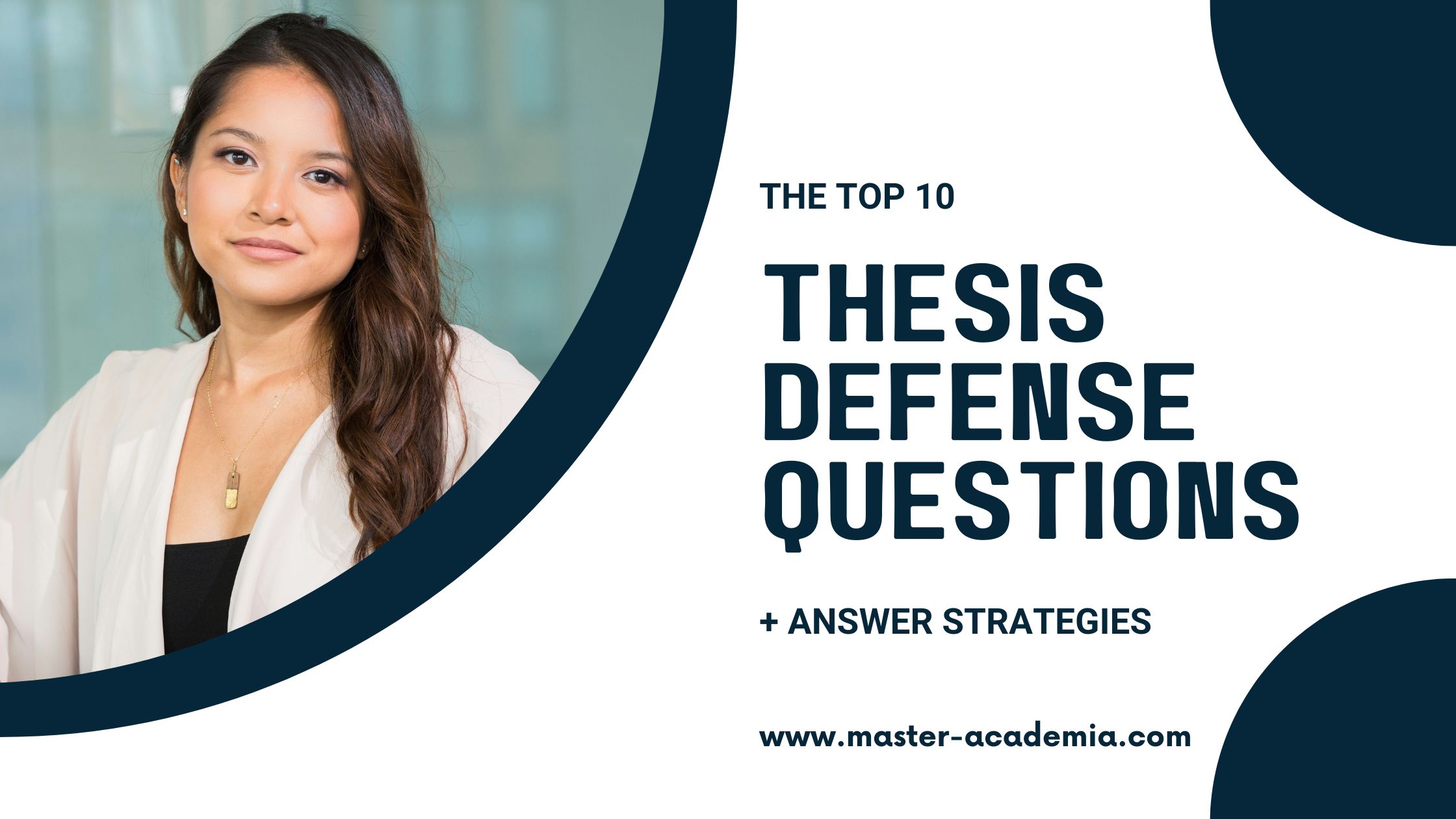
The top 10 thesis defense questions (+ how to prepare strong answers)
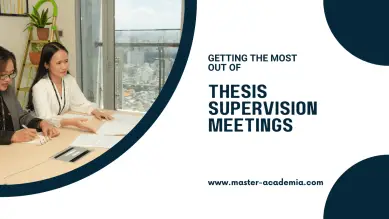
Getting the most out of thesis supervision meetings

How to prepare your viva opening speech

How to write a unique thesis acknowledgement (+ FAQs)
- Upcoming Events
- Our Valued Partners
- Explore the Major
- Inside the HM Elective
- Minors and Certificate Programs
- Honors Opportunities
- International Experience
- Professional Experience Advantage
- Scholarships in the School of Hospitality Management
- Transfer and Change-of-Campus
- Financial Aid and Scholarships
- Student Orgs and Leadership Experiences
- Study Abroad
- Undergraduate Research
- Discover SHM
- Careers in Hospitality
- SHM DEI Statement
- Commitment to Diversity
- NSMH Student Chapter
- Elite League of Hospitality Professionals
- Meet with an Adviser or Mentor
- Alumni Mentoring Program
- Follow SHM on Social
- Attend an Event
- Join a Research Lab
- SHM Update Newsletter
- International Opportunities
- Professional Experience Requirement
- Research Opportunities
- HHD Parents and Family Association
- University Parents and Families Weekend
- To be added to our newsletter and updates
- File Intent to Graduate
- Commencement Information
- SHM Recognition Ceremony
- How you can support the school
- Faculty and Staff
- Find the Right Degree for You
- M.P.S. in Hospitality Management
- Ph.D. Program
- Graduate Certificate in Hospitality Management
- Doctoral Minor in Human Resources and Employment Relations
- Faculty Advisers
- Current Graduate Students
- Research Expertise
- NSHM Student Chapter
- Graduate Student Council
- Student Organizations
- Follow SHM on Social Media
- Student Life at Penn State
- Graduate Research
- News and Events
- Graduate Admissions
- COVID-19: Return to Research
- Funding Opportunities
- HHD Research Office
- Penn State Central Research Support
- Ongoing Projects
- Research Interest Groups
- Food Decisions Research Lab
- HM People Project
- Hospitality Real Estate Strategy Group
- Research 2 Practice Webinar Series
- Listen to the Allinfoodz Podcast
- Diversity Statement
- Research2Practice- Hospitality DEI
- HHD Research
- HHD Career Spotlights
- Harvey P. Kamp Tribute Video
- HHD Alumni Society Awards
- PSHRS Awards
- Alumni in the Classroom
- Join the Penn State Hotel & Restaurant Society (PSHRS)
- Mentor a student
- Participate in events
- Sign up to receive the SHM Newsletter and updates
- PSHRS Facebook Group
- HHD Alumni Magazine
- Download the Tassl Engagement App
- Penn State Hotel & Restaurant Society
- Alumni Resources
- Alumni Association Membership
- Penn State Hotel & Restaurant Society (PSHRS) Membership
- Update Your Contact Information
- Career Resources for Alumni
- SHM Alumni Resources
- Young Alumni Ambassadors Program
- Diversity and Inclusion
- Biobehavioral Health
- Communication Sciences and Disorders
- Health Policy and Administration
- Hospitality Management
- Human Development and Family Studies
- Kinesiology
- Nutritional Sciences
- Recreation, Park, and Tourism Management
- Center for Childhood Obesity Research
- Center for Health Care and Policy Research
- Center for Healthy Aging
- Center for Safe and Healthy Children
- Edna Bennett Pierce Prevention Research Center
- Dean's Office
- Center for Student Advising and Engagement
- Communications and Marketing
- Development and Alumni Relations
- Finance and Accounting
- Human Resources
- Information Systems and Services (ISS)
- Online Education and Outreach
- Research and Graduate Education
- Faculty and Staff Resources
- Computing Support/IT Help
- HHD Digest - Submission and Archive
- Communications Training and Resources
- Powerpoint Templates
- Zoom Virtual Backgrounds
- Emergency Planning
- Contacts/Directory
The First Steps: Choosing a Topic and a Thesis Supervisor

There are two key choices you must make when you embark on your thesis: choosing a topic and choosing a supervisor.
Choosing a topic
A research topic can be very broad - you have not yet developed a specific research question but instead, have an expansive area of interest[1]. Here are some tips for choosing a successful thesis topic:
Let your interests guide you. This project will consume a considerate amount of your time during your junior and senior years, so pick a topic that you are genuinely interested in and committed to exploring. Think about interesting topics or readings from your coursework—what caught your attention?
Pay attention to your social world. Look to the media, news outlets, your friends - what issues are people debating now? What questions need answering?
Think of this as a chance to do something totally new. Is there a course you wish that the School of Hospitality Management offered about a certain topic? What research questions follow from that topic?
Engage with current or past research. See what has been done. Look at journals like the Journal of Hospitality and Tourism Research, the Cornell Hospitality Quarterly, and the International Journal of Hospitality Management. What topics have they covered recently? What can you add to the debate?
Your research topic does not have to be specific yet. Do some brainstorming—write down 5 to 10 topics that interest you. Talk with friends and professors to see which topics are the most interesting (and could provide the starting point for a strong thesis). Once you have decided on a topic, you are ready for the next step.
Choosing a thesis supervisor
Once you’ve identified the broad subject area you are interested in exploring, you should think about who to choose as a thesis supervisor. Any graduate faculty member of the School of Hospitality Management may serve as a thesis supervisor. A list of the current graduate faculty members is provided in the Appendix. We have one research center within the School of Hospitality Management, the Center for Food Innovation. If you work with this center as part of your thesis work, you should plan, consistent with best practices across laboratories in the College of Health and Human Development, to choose a faculty member other than personnel from the center to be your thesis supervisor. However, it is assumed you will also work closely with personnel from the center during the completion of your thesis work.
There are several ways to go about choosing a thesis supervisor. One strategy is to consider professors in whose courses you have been or are enrolled. Is your thesis topic relevant to their research interests? A second strategy is to look on the School of Hospitality Management website for a listing of faculty members and their research interests ( /shm/directory/BioList.aspx ). You can also think about interesting articles or books you’ve read in your coursework. Finally, you can meet with the School’s honors adviser to brainstorm about who a suitable thesis supervisor might be.
Once you have identified a potential thesis supervisor, you must ask him or her to advise the thesis! This should take place during the fall or spring semester of your junior year. Before approaching potential supervisors, do some brainstorming on your own. For your own use, write a brief description of your potential topics and 2-3 more specific research questions. When you meet with a potential supervisor, you do not yet need to have a definitive research question. This is something a thesis supervisor will help with.
You should set up appointments to discuss the thesis with potential supervisors. Send them an email requesting a meeting to discuss the possibility that they advise your thesis. Include the description of your topic. When you have scheduled a meeting, present your potential topic and ask them if they would be interested in advising it. If you are still working on developing your specific research question, ask for their advice or feedback on your potential research questions.
Examples of the questions to ask during your first meeting with a potential supervisor:
- How promising do you find my research topic?
- Are there particular directions you think I should explore in developing a research question?
- How often do you like to meet with advisees?
- How many drafts are you willing to read? How many days do you require to read a draft?
- What is your preferred method of maintaining regular contact?
- Do you have any books or journal articles that you think I need to read before our next meeting?
[1] Note that a topic is a broad subject area while a research question is much narrower. A research question is a specific problem or question within a given subject area that can be addressed within the approximate 1.5-year time frame given over to the thesis A research question is typically tested with empirical data.
Return to Thesis Guide Table of Contents


How to Write an Email to a Potential Supervisor (With examples)
- December 15, 2021
- GRADUATE ADMISSIONS

Writing to a potential supervisor can exponentially increase your chances of securing a position as a graduate student. However, you will be walking in a thin line between setting up a great first impression or a pretty bad one.
The good news is that leaving a great impression is much simpler than you would think; it simply comes down to how you structure your first email.
When I was applying for my graduate program, I sent 130 emails to different professors in different universities in both USA and Canada. For those 130 emails I sent, I got 53 replies, with nearly 40% conversion rate. From those 53 replies, 22 professors were interested in offering me a position in their lab and encouraged me to apply formally through the university’s graduate office.
In this blog post, you will find some helpful information that I figured out during my application process about writing an email to a potential supervisor.
How appropriate would it be to write an email to a potential supervisor?
Reach out and write an email to a potential supervisor before applying is definitely one of those topics where you want to find out about the norms in your discipline.
Reaching out to potential advisors ahead of time is fine, helpful but not necessarily required for most people.
In some fields, it might be strange or unexpected or something that people don’t usually do, and in some other fields, it might almost feel like a requirement.
This might be different in different fields because, in some disciplines, advisor fit is much more important than others.
Suppose you are in a discipline like humanities where you’re not working very closely with an advisor. In that case, it might be that students are accepted into the department generally, and that advisor fit doesn’t really matter.
In that case, you should still talk about specific faculty in your statement of purpose because that is a good reason why you’re applying to that program.
It shows that you’ve done your research.
But you probably don’t need to do fact-finding on the capacity of individual faculty members before you submit your application.
But if you are in one of those disciplines where advisor fit can be essential for admission, writing an email to a potential supervisor is very important.
Overall, reaching out to potential advisors isn’t something you have to do, but it’s really more of a fact-finding mission.
It can be beneficial for you to get some helpful information.
Find out if they have the resources to recruit you.
Sometimes there’s one perfect potential advisor for you in a department, and that person cannot take on new advisees for some reason.
Maybe the funding capacity limit is already reached when you email the professor.
If that’s the case, they often are upfront about that and might even suggest other people that you should consider talking to or writing about in your application materials.
If you get one of these responses from a professor who says,” I’m unlikely to take on new PhD advisees”, that does not mean that you should not apply for that program.
Also, do not forget to follow up because sometimes the funding capacity can change at the last moment.
This is one of the advantages of writing an email to a potential supervisor because they might let you know if something like that happens.
But it’s good for you to know that you should look into other options as well. Even if you are highly interested in that particular program, putting all your eggs in one basket is not a good idea.
The other important thing that you could find out from reaching out to a prospective advisor is their current research direction.
For example, if you look at someone’s recent publications, think about when the professor did that research.
If a paper is published recently, this paper went through peer review.
Roughly add the revision time and paper writing time.
They might have done that research two years ago.
Are they still doing that kind of research?
You can, of course, find out a fair amount of research work and their timelines by going to a faculty member’s website or by looking at current grant funding.
Especially, grand funding tells you what that person will be doing for the next few years.
People’s trajectories can change a lot.
Have I ever made a mistake like this? I have. Big time! See the below email I received when I was writing to a professor!

So, you want to make sure you have an idea of what they’re doing now because you could mention them in your statement of purpose letter .
When should you reach out to a potential supervisor?
Typically graduate applications are due late fall / early winter.
You should check and make sure that you have a sense of this timeline.
It wouldn’t necessarily hurt to reach out earlier.
But, I would recommend reaching out one to two months before the deadline because that’s when supervisors know if they can offer new graduate student positions.
Sometimes funding decisions come in over the summer, so they might undoubtedly know whether they’re taking on new graduate students when the deadlines are closer.
Another reason not to email professors early is, some professors aren’t working as much over the summer.
Also, they might be heads down and writing a book or doing research and not responding to emails quite as readily as they might during the academic year.
A template for writing an email to a potential supervisor
Here’s an example email that I used when applying for graduate programs. This is the email I wrote to the professor I’m currently working with.
Make sure to adjust this email to be compatible with your field of study.
This will give you a sense of the information you might want to mention in your email.
Title: Inquiry from a prospective graduate student Dear Professor [name], I am a (Your major) graduand from the (Your university). I’m interested in a graduate study opportunity under your supervision in your research group. I am considering applying to your department’s graduate program, one reason being that I am very interested in the work you are doing on Hydrophobic surfaces. Given that your research takes both experimental and theoretical approaches for surface analysis and development, it further encourages me to apply since it is a perfect confluence of my research interests. I particularly enjoyed your paper “(Paper that you’re interested in)” and possibly see myself doing that kind of work. My own research interests relate to surface and interface science, computational materials science, thin films and coatings, and electrochemistry. I graduated with a (Your overall GPA) and a (CGPA) in the last two years of undergraduate study and am currently working as a researcher for eight months at [institute], a world-leading manufacturer of weight measurement technologies. At [institute]’s research lab, I am implementing studies on the micro throwing power of watt’s type baths by electrochemical simulations (COMSOL Multiphysics), ideally targeting to enhance Ni20Cr thin films’ surface wettability. I have just submitted an article on my current research findings, which was accepted by Materials Today: Proceedings. I have attached our recent publication and other relevant documents with more details. I am wondering if you will be considering taking on new PhD advisees for September intake or if you have suggestions for other faculty I should reach out to. I would be happy to answer any questions or have an online interview if more information would be helpful. ( Your signature )
You will find more tips of writing the perfect email to a potential supervisor here .
First and foremost, do not forget to do your homework before writing an email to a potential supervisor.
Do not send the same email to every professor that you choose.
Although it seems like a lot of work, do your research first and write a specific email for each supervisor. You can always use similar phrases here and there but never use the same template because a professor who receives many such emails can easily understand what you are doing.
And, that is not a good first impression.
If you want to have a robust application, you need to research what faculty are doing.
Also, note that my email word count is nearly 250. Not including many things in your email is also essential when writing an email to a potential supervisor.
Professors are always busy. They do not have to spend more than 1 or 2 minutes on an email. So you must know to impress the professor within that time frame, or your email will go straight to the junk folder.
Note that I also mentioned a paper that I was interested in. This is optional. But if you decide to mention a paper, make sure that you understand the basic concepts of that paper. Because, if this email leads to a quick interview, they might ask some questions from the paper. If that happens, you don’t want to embarrass yourself.
But just mentioning the general research area is more than enough for the first email because it shows that you’ve done your homework.
Also, it’s very important to mention that your research interests and the supervisor’s current area of research are similar.
It doesn’t have to be exactly the same.
But it should be in the same domain. In this example, my prospective supervisor (When I was writing this email) was working on a combination of physical chemistry and computational modelling. The interests I mentioned align with what he was interested in. But they are not precisely the same.
Maintain an effective email management system
At the time I was writing to potential supervisors, I was working full-time in a research lab. My work schedule was 10 hours a day. So, it took me a while to begin writing to potential supervisors.
In fact, it was too late to start writing, and I was told by friends to wait until next year to apply. They have already contacted supervisors and secured graduate positions at this point.
This is when I snapped out of my procrastination bubble and began thinking about how to secure a graduate position. Moreover, I had very specific research interests, so getting into a graduate program has already been challenging in the first place.
Before contacting professors, I also reviewed their profiles at hundreds of universities to find relevant labs.
Therefore, I needed a robust and efficient system for emailing potential supervisors. After a few tweaks, I created an effective yet simple system for managing graduate applications.
I use the notion app to build my graduate application management system.
It only took me two weeks to find professors whose research interests were similar to mine. And I have secured a graduate position in a lab conducting the exact research I was interested in.
You can grab the template by clicking the link below.

Do not directly ask for a meeting
Something else that you might have noticed that the email was ended with :
” I would be happy to answer any questions or have an online interview if more information would be helpful.”
There are lots of different ways that you could do mention this.
However, you may want to leave the option open without directly demanding a meeting.
Because if that prospective professor is not taking new advisees for the term, it would not be a great use of either of your time to have a meeting.
If the professor wants to talk more to you, they might be the one to suggest a meeting.
Or wait until you get a reply from them to decide to ask for a meeting, depending on their response.
They also might offer in their reply to answer questions, in which case you can ask questions in an email, or you can say,
“I do have some questions. Would you prefer email, or would it be easier for you to talk on the phone or video conference call?”
Why would you not get a reply?
But, sometimes, you might not get a reply at all.
It’s very important not to take it personally if they do not respond to your email.
My email conversion rate was 40%, which means that I haven’t heard anything 60% of the time.
Believe it or not, professors receive more than 100 emails per day when the deadlines are closer. So, there is a bigger chance that the professor hasn’t even seen your email.
Maybe your research background does not properly align with what they are looking for from a graduate student to join their lab. Here’s a reply I received from a professor mentioning this issue.

There are other reasons to why you haven’t heard when you write an email to a potential supervisor.
- The applicant has no clear idea about their research interests.
- There are no vacancies in their labs to accommodate new students.
- Your email is poorly drafted, and you have not specifically addressed that particular professor.
- You copy many professors in a single email.
- There’s no subject on the email.
Types of responses you might get
If you don’t hear back from a professor, do not assume that that means you shouldn’t apply to that program, or you shouldn’t mention them in your statement of purpose.
You can’t assume that a non-response means that they have no interest in your application.
It’s possible that when you reach out to someone, they might be excited to talk to you.
Many of the kinds of conversations you might have in a pre-application discussion with a faculty member might be pretty similar to the type of conversation you would have after you’ve applied.
So, it’s helpful to have a meeting/interview with a professor this way.
Also, if a professor suggested looking for other faculty members, you should email them.
Because those suggested professors might work in a research area that you might be interested in. It might also be a signal for people who have funding or actively recruiting new students.
So, research them and consider reaching out to them if they mention someone specific.
You might also get a very vague reply such as :
“Thank you for reaching out. I look forward to seeing your application.”
You do not have to take that as a bad sign; it just means that they’re looking forward to seeing your application.
They chose to reply to you even though they have the freedom to ignore your email. That means something. Do not lose hope.
Make sure to mention the faculty members who replied to you so that they will recognize your application in the application evaluation process.
Final words
Writing an email to a potential supervisor is an essential step in your graduate application process.
Having a clear idea about who you are writing to and why you are writing to that person is important to get a reply.
If you have gone through the same process and found some important aspects about writing an email to a potential supervisor, let us know in the comment section.
As always, be proactive, be kind and try to help one another!
Images courtesy : Mail vector created by stories – www.freepik.com , Business photo created by creativeart – www.freepik.com , phdcomics , Image by Freepik
Aruna Kumarasiri
Founder at Proactive Grad, Materials Engineer, Researcher, and turned author. In 2019, he started his professional carrier as a materials engineer with the continuation of his research studies. His exposure to both academic and industrial worlds has provided many opportunities for him to give back to young professionals.
Did You Enjoy This?
Then consider getting the ProactiveGrad newsletter. It's a collection of useful ideas, fresh links, and high-spirited shenanigans delivered to your inbox every two weeks.
I accept the Privacy Policy
Hand-picked related articles

How to ace the GRE and get into your dream school in five steps
- February 19, 2024

The Art of Writing a Winning Statement of Purpose for graduate school (With examples)
- January 28, 2024

A Step-by-Step Guide to Researching Potential Graduate Programs
- January 13, 2024
Very useful article. Thank you so much for sharing your experiences. I want to know about followup emails. How long we have to wait ?
I’m glad this article was helpful to you, Poornima!
Professors sometimes do not respond to emails for the following reasons: (1) They are genuinely busy. (2) They do not have funding to support your education and (3) Their inboxes are flooded with emails every day, and responding to them all can be a challenge.
Although the time to write a follow-up email depends on your own circumstances, give them a reasonable amount of time to respond. It is a good idea to wait at least one week before sending a follow-up email.
You can read our other blog posts to learn more about writing follow-up emails .
Leave a Reply Cancel Reply
Your email address will not be published. Required fields are marked *
Name *
Email *
Add Comment *
Notify me of follow-up comments by email.
Notify me of new posts by email.
Post Comment
404 Not found
Have a language expert improve your writing
Run a free plagiarism check in 10 minutes, generate accurate citations for free.
- Knowledge Base
Email contact with your dissertation supervisor
Published on October 13, 2015 by Sarah Vinz . Revised on August 24, 2018.
How to best approach your dissertation supervisor via email can vary by supervisor. For example, some supervisors are fine with being addressed by their first name, while others would prefer that you only use their title and surname.
Table of contents
The style and tone of your message, addressing your supervisor, keep it short and sweet, no response from your supervisor, formal or informal, here's why students love scribbr's proofreading services.
Discover proofreading & editing
Checklist: Formal email contact
Use an appropriate salutation. Example: Dear Dr. X,
Explain the purpose of your email. Example: I am writing in follow-up to our meeting on Monday.
Be brief and clear about exactly what you want to say or ask. Example: I have made the changes that we agreed on. Could you please check and confirm them?
Express your appreciation in advance. Example: Thanks in advance for your help.
Use an appropriate closing. Example: Sincerely,
Your email looks appropriately formal.
In your first email contact with your dissertation supervisor, it is wise to address him or her quite formally (such as “Dear Dr. X” or “Dear Prof. Y”). You do not know what your supervisor will be comfortable with, so it is best to play it safe.
If your initial contact is too informal, your supervisor may get the wrong impression and start to question your professionalism and attitude.
If your supervisor’s response to your email closes with only his or her first name (such as “Sincerely, Ken”), you can assume that it is okay to address him or her by first name in your next message. To be extra safe, you can also wait until you have received a few more messages where he or she has closed in this way.
Examples of salutations and closings
Email signature.
It is generally not necessary to use an email signature when corresponding with your supervisor. However, if your program requires that you do so or if it is your personal preference, you can use the following model:
- Name (first and surname)
- Educational institution
- Phone number
- Email address
Flawless writing
What is important in all cases is that your message is error-free. Make sure you use proper English (or whichever language is appropriate) and that you do not make any grammatical or spelling errors. Before you send a message to your supervisor, you are strongly advised to re-read the text carefully or even to have someone else read it, too.
A neat and accurate message shows your supervisor that you are both professional and serious about your project.
Dissertation supervisors are often busy people who are involved in many things at the same time. It is therefore important to be as clear and specific as possible in your messages, so they can quickly see what your problem is and then react.
Tips for writing clear and maintaining smooth contact
- Make sure you stick to only things that are relevant to your dissertation. For example, do not share stories from your personal life with your supervisor (unless they are important with regard to your results).
- Formulate your questions as clearly and concisely as possible , so that your supervisor understands what you want and can respond quickly.
- Do not ask long or complicated questions in an email; saving these queries for times when you have more personal contact will make things easier for both of you. You will spare your supervisor the time that he or she would need to reply in writing. On your side, asking such questions face-to-face allows you to get more comprehensive answers and to ask follow-up questions if you do not understand something.
- Give your supervisor enough time to respond. For example, don’t send questions the night before you have to submit something; do it a few days in advance instead.
- Always respond as quickly as possible to messages from your supervisor (when relevant). This includes confirming any appointments your supervisor proposes, answering all of his or her questions, indicating things you don’t understand and providing any information that he or she requests.
- The responsibility for writing the dissertation is yours. Instead of waiting for your supervisor to make contact, take the initiative to make an appointment. This is also better for your supervisor, because it shows him or her that you are serious about your project.
Confirming appointments via email
If you arrange something about an appointment with your supervisor verbally, it is smart to still confirm it via email. You then have something in writing to fall back on if any issues arise.
Similarly, it is also a good idea to summarize what you have agreed on, such as deadlines and matters relating to substantive issues. Ask your supervisor to check and confirm your notes, so that you are both 100% clear on where you stand.
See some sample emails
Supervisors will generally always respond to your messages, but some are faster than others. If you do not get a reply, first think about whether there could be an obvious reason for the delay, such as that it is already late in the evening, it’s the weekend, or it’s a holiday.
Also note that not all supervisors are available five days a week. You can often find out what days your supervisor is available through your school. Before taking any action, consider how fast you need an answer. You don’t want to appear too impatient to your supervisor.
If you really cannot wait any longer or you haven’t heard anything from your supervisor in several days, send a polite reminder email. You can either briefly restate your question or refer to your previous message.
If you still do not get a response, try contacting your program or university. A department secretary can often connect you with your supervisor.
Cite this Scribbr article
If you want to cite this source, you can copy and paste the citation or click the “Cite this Scribbr article” button to automatically add the citation to our free Citation Generator.
Vinz, S. (2018, August 24). Email contact with your dissertation supervisor. Scribbr. Retrieved March 25, 2024, from https://www.scribbr.com/tips/e-mail-contact-with-your-dissertation-supervisor/
Is this article helpful?
Sarah's academic background includes a Master of Arts in English, a Master of International Affairs degree, and a Bachelor of Arts in Political Science. She loves the challenge of finding the perfect formulation or wording and derives much satisfaction from helping students take their academic writing up a notch.
"I thought AI Proofreading was useless but.."
I've been using Scribbr for years now and I know it's a service that won't disappoint. It does a good job spotting mistakes”

6 Email Templates to Ask Someone to be on Your Thesis Committee
By: Author Hiuyan Lam
Posted on Last updated: October 20, 2023
Categories Professional Etiquette

Writing a thesis is one of the most challenging parts of being an undergraduate or graduate student. You need to know how to ask someone to be on your thesis committee, especially if you are looking for a mentor to guide you through the writing process.
If you are currently starting the dissertation process, these unique email templates will help show you how to ask someone to be on your thesis committee.
How to ask someone to be on your thesis committee: When asking senior students
These email templates will help you figure out how to ask a senior student to be on your thesis committee. Senior students are perfect for helping you through the writing process. You can ask a student with whom you get along and share similar ideas.

When asking professors to be on your thesis committee
Your professor would be an invaluable addition to your thesis committee, especially since they could provide you with unique insight and constructive criticism. Here is how to ask someone to be on your thesis committee if the person is your professor.

You May Also Like:
30 Great Words to Describe a Teacher
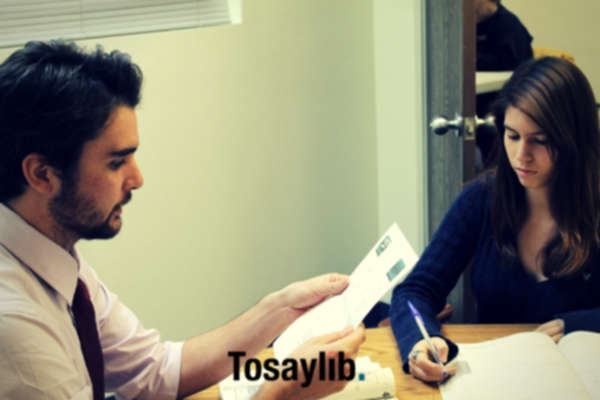
How to ask someone to be on your thesis committee: When asking professionals in your field
Professionals can offer diverse and useful expertise if they choose to join your thesis committee. Here is how to ask someone to be on your thesis committee if you’re asking professionals in your field.

These are unique email templates that you can use when trying to figure out how to ask someone to be on your thesis committee. Whether it is your professor, a senior student in your faculty, or a professional in your field, these templates will help you get that positive response that you are seeking. If you are currently working on your thesis and wondering how to ask someone to be on your thesis committee, these templates will surely help you get some ideas.
404 Not found

- How to Email a Potential Supervisor
- Applying to a PhD
It’s well known that contacting a potential PhD supervisor before applying to their position can greatly increase your chances of success. Unfortunately, it also works the opposite way.
The good news is that leaving a great impression is much simpler than you would think; it simply comes down to how you structure your first email.
To learn how to email a potential supervisor the correct way, follow our guidelines below.
Guidelines for Your First Email
1. do your research.
Before contacting a supervisor, you need to have researched them. Hopefully, you would have already have done this before deciding that they would be suitable for your project. However, if you haven’t, read up and learn about their research.
This is important to confirm that your project is relevant to the supervisor and that they have suitable expertise to support you.
As well as information about their research and recent publications, you can find their email address on their University’s academic profile page. Their email address should also be available in the PhD listing you originally saw the position.
2. Use a Clear Subject Line
Use a short subject line which clearly shows your intention. Supervisors receive countless emails a day from students, other professors, external collaborators and research bodies. Therefore, an unclear subject line will probably go unnoticed in their busy inbox.
Good examples of subject lines include:
- Enquiry for NERC-funded PhD in Climate Change
- Prospective Applicant – EPSRC – Material Science PhD
If the University provides a reference number in the PhD listing you found the position, ensure you include it at the end of your subject line.
3. Address Them
Always start your email with “Dear” followed by the supervisor’s surname.
Make sure you use the supervisor’s correct title. Starting an email to a professor with “Dear Dr” rather than “Dear Professor” won’t only annoy them but will imply you have poor attention to detail. Therefore, using the wrong title will immediately set a poor impression and sometimes may even be enough for the supervisor to stop reading your email.
4. Introduce Yourself and State Your Intentions
First, introduce yourself by providing the following information:
- Your academic qualifications
- Your level of experience
Second, indicate that you are interested in undertaking a doctoral research project. If you’re emailing regarding a specific project, then provide its title.
If the University isn’t offering projects with pre-defined titles, then instead indicate which specific areas of the research field you are interested in. When expressing your research interests, also discuss why you are interested in having them as your supervisor. In your explanation, include relevant examples of their recent work and relate it back to your research topic. This will show the supervisor that you have thought about the direction of your research and have undertaken detailed research around the topic. It will also show that you’re familiar with their work. This won’t only help build rapport but will also show the supervisor that you believe he will be a good match for you.
After discussing your interests, confirm that you meet the eligibility requirements and move on to discuss your funding situation. If you intend to apply for funding or a scholarship on acceptance into your programme, mention this and list the names of the funding bodies and scholarships you will be applying to.
5. Conclude
Conclude your email by reinforcing your enthusiasm for the position and summarising why you think you’d make a great research student.
In addition to this, you could also suggest a meeting as a way for the two of you to discuss the contents of your email. This isn’t required but does sometimes make it easier for the supervisor if they have a lot to discuss.
6. Thank Them
Thank the supervisor for their time and end your email with “Kind regards” followed by your first and last name in full.

Email Etiquette
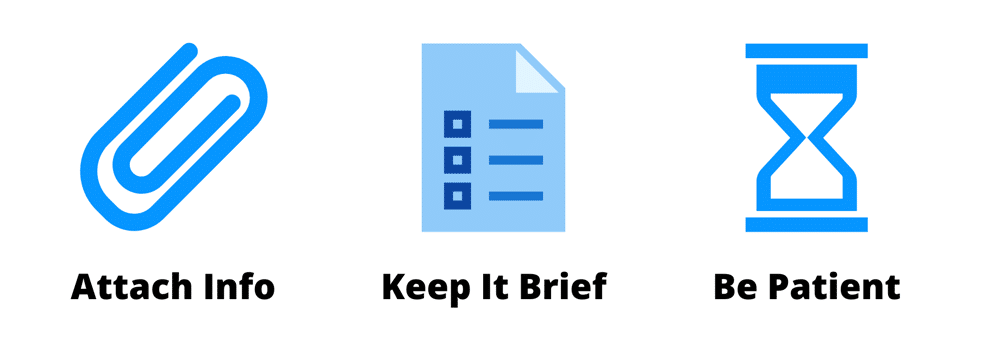
Attach Supporting Information
Your goal should be to make the exchange as simple as possible for the supervisor. Therefore, attach any supporting information such as your CV if you expect they may ask for it or find it useful. This will save them having to email you back asking for further information should they need it.
Keep It Brief
As mentioned above, supervisors won’t have time to keep going back and forth, therefore, avoid vague statements or being too broad about your interests.
Whilst it’s OK to email several potential supervisors offering similar positions, ensure you tailor each one so it’s relevant to the specific supervisor you’re emailing. If your email is too generic, they’ll likely think you repurposed it from one of your earlier emails to another supervisor and so choose to ignore it.
Lastly, before you hit send, read over your email and confirm it’s free from any grammatical mistakes. As a postgraduate student applying to a PhD position, your email needs to be error-free.
Be Patient With Follow-Ups
Supervisors are extremely busy people. They have classes to teach, research students to supervise and several independent projects to lead. Therefore, don’t be too disheartened if you don’t hear back from them right away.
If you don’t receive a reply after a week, send them a polite follow up. If they still don’t get in contact after another week, they’ve likely either stopped accepting applicants are too overwhelmed to process their inbox. In these cases, it’s best to start looking for alternative supervisors.
Finding a PhD has never been this easy – search for a PhD by keyword, location or academic area of interest.
Browse PhDs Now
Join thousands of students.
Join thousands of other students and stay up to date with the latest PhD programmes, funding opportunities and advice.

The Plagiarism Checker Online For Your Academic Work
Start Plagiarism Check
Editing & Proofreading for Your Research Paper
Get it proofread now
Online Printing & Binding with Free Express Delivery
Configure binding now
- Academic essay overview
- The writing process
- Structuring academic essays
- Types of academic essays
- Academic writing overview
- Sentence structure
- Academic writing process
- Improving your academic writing
- Titles and headings
- APA style overview
- APA citation & referencing
- APA structure & sections
- Citation & referencing
- Structure and sections
- APA examples overview
- Commonly used citations
- Other examples
- British English vs. American English
- Chicago style overview
- Chicago citation & referencing
- Chicago structure & sections
- Chicago style examples
- Citing sources overview
- Citation format
- Citation examples
- College essay overview
- Application
- How to write a college essay
- Types of college essays
- Commonly confused words
- Definitions
- Dissertation overview
- Dissertation structure & sections
- Dissertation writing process
- Graduate school overview
- Application & admission
- Study abroad
- Master degree
- Harvard referencing overview
- Language rules overview
- Grammatical rules & structures
- Parts of speech
- Punctuation
- Methodology overview
- Analyzing data
- Experiments
- Observations
- Inductive vs. Deductive
- Qualitative vs. Quantitative
- Types of validity
- Types of reliability
- Sampling methods
- Theories & Concepts
- Types of research studies
- Types of variables
- MLA style overview
- MLA examples
- MLA citation & referencing
- MLA structure & sections
- Plagiarism overview
- Plagiarism checker
- Types of plagiarism
- Printing production overview
- Research bias overview
- Types of research bias
- Example sections
- Types of research papers
- Research process overview
- Problem statement
- Research proposal
- Research topic
- Statistics overview
- Levels of measurment
- Frequency distribution
- Measures of central tendency
- Measures of variability
- Hypothesis testing
- Parameters & test statistics
- Types of distributions
- Correlation
- Effect size
- Hypothesis testing assumptions
- Types of ANOVAs
- Types of chi-square
- Statistical data
- Statistical models
- Spelling mistakes
- Tips overview
- Academic writing tips
- Dissertation tips
- Sources tips
- Working with sources overview
- Evaluating sources
- Finding sources
- Including sources
- Types of sources
Your Step to Success
Plagiarism Check within 10min
Printing & Binding with 3D Live Preview
E-Mail To Dissertation Supervisor – How To Approach It
How do you like this article cancel reply.
Save my name, email, and website in this browser for the next time I comment.

Writing an e-mail to your dissertation supervisor can feel daunting. The process is often marked with anxiety, especially when one is uncertain about the nuances of professional communication or the specific expectations of their supervisor. Efficient communication with your academic advisor is a vital factor in your process towards completing a dissertation . This guide provides practical tips on how to draft an e-mail to your dissertation supervisor.
Inhaltsverzeichnis
- 1 E-mail to Dissertation Supervisor – In a Nutshell
- 2 Definition: E-mail to dissertation supervisor
- 3 E-mail to dissertation supervisor: Style and tone
- 4 E-mail to dissertation supervisor: Tips
- 5 E-mail to dissertation supervisor: No reply
E-mail to Dissertation Supervisor – In a Nutshell
- The first e-mail to dissertation supervisor should have a clear subject title, a formal salutation, and error-free language.
- Keep your e-mail to dissertation supervisor short, relevant and with a clear call to action.
- If you do not receive a response to your e-mail in, say, a week, you can send a polite follow-up email.
Definition: E-mail to dissertation supervisor
There are several instances where you would need to send an e-mail to dissertation supervisor, as highlighted in the list below:
- Arranging an appointment for an initial appointment of a follow-up meeting.
- Asking questions about a problem you encounter and getting clarification.
- Confirming agreements for matters you discussed.
It is a good idea to make a summary of what you and your supervisor agree on regarding issues such as deadlines and steps forward. Request your supervisor to verify your notes to ensure you agree and are completely clear on the way forward.

E-mail to dissertation supervisor: Style and tone
Write your e-mail to dissertation supervisor formally and use your school email address to come across as professional (in place of your account). The guide below gives tips on writing the e-mail to dissertation supervisor, the style to use and what to avoid.
Addressing your supervisor
It is best to address your supervisor formally in your first email. Since you do not know how they would prefer to be addressed, it is better to err on the side of caution. An initial informal e-mail to dissertation supervisor may send the wrong message and cast doubt your attitude and professionalism.
If your supervisor responds to your email with their first name in the closing, e.g., (‘Sincerely Gabriel’), it may be okay to address them by their first name in the following email. However, we recommend waiting until you have exchanged a few more emails where they have closed informally to be extra safe.
The table below gives examples of closings and salutations you can use in your e-mail to dissertation supervisor on formal and informal occasions.
Email signature
Using an email signature is at your discretion, although it is not necessary. However, you can model it as below if you do choose to use it or if your program requires it:
- First name and surname
- Study program
- Institution of study
- Telephone number
- Email address
The e-mail to dissertation supervisor must be well-written with good grammar and correct English (or any appropriate language). We strongly recommend that you proofread your e-mail to dissertation supervisor carefully for any mistakes before sending it or ask another person to read it to get a fresh set of eyes on it.
A concise e-mail to dissertation supervisor will display your professionalism and seriousness about your project.
E-mail to dissertation supervisor: Tips
Below are some valuable tips for writing an e-mail to dissertation supervisor.
Concise subject line :
The purpose of a subject line is to summarize the email and get the reader interested. Use a short, clear summary to reinforce your call to action.
Connections :
Make sure you mention any connection you may have with the supervisor. Did you hear the professor speak at an event, or were you referred to them by a former student or their colleague?
Keep it relevant :
Dissertation supervisors are usually busy, so stick to what is pertinent to the dissertation. For instance, do not add personal anecdotes to your e-mail to dissertation supervisor unless they are essential to the application.
Do not ask long, complex questions in the e-mail to dissertation supervisor :
Save any complicated questions for when you can speak to your supervisor more personally. This will allow you to get detailed answers and follow up where you are dissatisfied with a response. You will also save your supervisor the time and effort needed to write replies to your questions.
Have a clear CTA (Call to Action):
Your e-mail to dissertation supervisor should be very clear and leave no doubt about what you want from them. Ask your questions as clearly as possible. You are more likely to get a faster response if your supervisor is clear on what you want.
Introduce yourself :
After requesting to work with them, introduce yourself briefly. Include your institution of study, research interests and why you are interested in working with them. We also recommend attaching your resume to the email.
Respond as quickly as you can:
Confirm any appointments your supervisor makes, provide any information they request, answer their questions and request clarification on what you don’t understand. Taking the initiative to contact your supervisor shows that you are serious and driven. Contact your supervisor to arrange an appointment instead of waiting for them to set it.
E-mail to dissertation supervisor: No reply
Supervisors will usually always respond to your emails; however, the reply rate may vary. Do not take it personally if they do not respond to your email immediately. Researchers also teach research and travel, and may even supervise other students.
If you don’t receive a reply in about a week, you can follow up politely. However, be careful not to look too impatient by not allowing your supervisor sufficient time to reply.
If your supervisor still does not respond after your follow-up e-mail, you can contact your program or the department secretary, who can contact you with your supervisor.
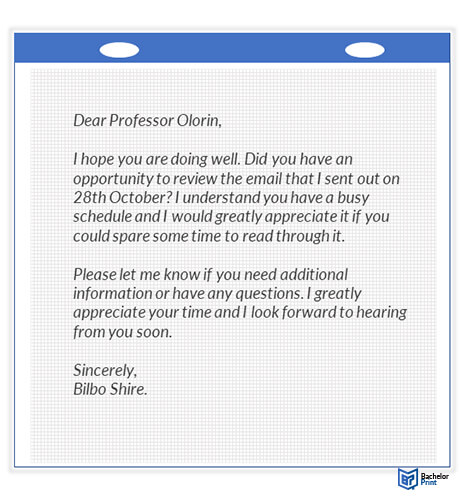
How should you approach a dissertation supervisor?
Your first e-mail to dissertation supervisor should clearly state who you are and what you would like from them. It is beneficial also to mention how you heard of them, whether by attending their lectures, by recommendation, or another way.
When can I address my dissertation supervisor informally?
In your first e-mail to dissertation supervisor, address them formally by their title to avoid giving the impression of unprofessionalism. If your supervisor responds with an informal closing severally, you may assume that it is alright to address them as so.
Can I contact other potential supervisors?
Yes, you can. However, when sending an e-mail to dissertation supervisor, you should make it clear from the beginning that you are also contacting other potential supervisors.
This transparency will help you avoid any misunderstandings in the future.
What should I do if I don't get a reply to my e-mail to dissertation supervisor?
The response speed will vary among supervisors, as most are often busy with other commitments. Wait for about a week, then send a polite follow-up e-mail to dissertation supervisor.
We use cookies on our website. Some of them are essential, while others help us to improve this website and your experience.
- External Media
Individual Privacy Preferences
Cookie Details Privacy Policy Imprint
Here you will find an overview of all cookies used. You can give your consent to whole categories or display further information and select certain cookies.
Accept all Save
Essential cookies enable basic functions and are necessary for the proper function of the website.
Show Cookie Information Hide Cookie Information
Statistics cookies collect information anonymously. This information helps us to understand how our visitors use our website.
Content from video platforms and social media platforms is blocked by default. If External Media cookies are accepted, access to those contents no longer requires manual consent.
Privacy Policy Imprint
Dr. Heidi Toivonen
Psychologist
How to Make Your Thesis Supervision Work for You
1. it’s your thesis and nobody else’s.
This sounds like a self-evident thing, right? Surprisingly often, it is not. So what does it mean in terms of how to make your thesis supervision work for you to say that it is your thesis and not your supervisor’s? It means of course that you do all the required parts of the thesis from literature review to the data analysis and the interpretation of the results. But it also means something more than that. It means taking intellectual responsibility of your thesis. Most of the time, your supervisor (at least if it’s me), will give you suggestions, not orders. It’s up to you to decide how you implement them.
If I ask you, for example, to write something in a clearer way, you are the one who has to figure out how to make this happen in actual sentences that you type on your keyboard. If I leave comment in the margins of your thesis asking for you to build a clearer bridge between two paragraphs and you respond to it by writing a comment like “But how?”, the answer to the question is that I won’t tell you. That’s why I’m your supervisor, not your co-author. Your job in writing a thesis is to figure out some things out all by yourself. You need to try and build that clearer bridge, not ask your supervisor to do it for you. If you are still stuck with building this metaphorical bridge after trying, then ask your supervisor. Perhaps they can help you think of some ways to make it happen.
You will make the most out of your thesis supervision and -writing as well as ensure a functioning working relationship with your supervisor, if you from the beginning, at every step of the process, remember that it is your thesis, not theirs. That being said, if you are a BSc or a MSc thesis writer, I do recommend that you always take into account the concrete and specific suggestions of your supervisor, whether they are about doing some part of your analysis differently or reading a specific article. Doing a PhD is a bit different and might occasionally require you to be more independent and even deviate from the suggestions of your supervisor. Sometimes this turns out to be a mistake, sometimes not.
However, I’m by no means arguing that supervisors know everything or that their advice is always flawless. The advice you get from me as a supervisor is not a word of Divine truth but rather a well-informed opinion on something. Doing research is a dynamic and complex process, not a school exercise where things are right or wrong and advance in a linear manner. I’m going to tell you more about that in the next chapter.
2. Have a Flexible Mindset and Tolerance for Dynamic Processes
Research is never a linear and simple process. Doing a thesis is not like taking a multiple choice exam, where an answer is either correct or not. In all likelihood, writing your BSc or MSc thesis is your first experience of doing something that resembles real world research. Welcome to the world of dynamic and complex processes!
I supervise only qualitative theses, that is, works that analyze textual data. My own research has been mainly qualitative, because I have always been most interested in how people talk about things and how they build different phenomena in their verbal interactions. In other words, for me, the most meaningful data is verbal and stems from for example therapy conversations, interviews, or reading groups. Thus, I’m very happy to be acting as a first supervisor in different kinds of qualitative thesis projects. If you want to learn more about qualitative research, you can look for example here .
I might venture to say that the world of qualitative research is even more dynamic than that of quantitative. This means many things. It means that you might decide your actual research question and analytical method only after having already read through all of your transcribed interviews. It means that you might have started happily conducting a Discourse Analysis on transcribed sessions of reading group meetings, while you realize that this method is too detailed and takes you theoretically to a direction where you don’t want to go. Then you switch to Thematic Analysis and do everything again from the start. You will probably write your method section only after you have actually finalized your results, because the back-and-forth, iterative movement between data, analysis, and literature causes the research process to be complex. You cannot articulate what and how you did until you are ready with the results. I could give you more examples, but I think you get the point. So what does all this mean in terms of your thesis supervision?
It means that you will get something that students call “conflicting feedback”. Sometimes, my students complain that my feedback changes from session to session and conflicts with what the second supervisor says. You know what, I would be worried if that was not the case! If the supervisor does not write different and even conflicting comments in the margins of your different thesis versions and if the feedback does not change at all from session to session, it might be because of two things. Either the supervisor is not really reading your thesis and/or has decided only to feedback a certain section once and no more. The other option is that you are stuck with your process and the thesis is not going through the journey it should. There is simply not enough there to give conflicting comments about!
A thesis is a complex piece of work. If you change something in your conclusions and how you discuss them, it probably means something needs to be changed in the introduction. If you change how to present your results, you might have to tinker with something in the method section. From this it often follows that at one point your supervisor will tell you to do X and in the next phase they change their mind and tell you to do Y. In many cases, you will get feedback about your introduction before you have your results figured out. It’s obvious that the introduction needs to be edited once you have the results down. Changing even a small section of your thesis might cause a domino effect requiring further changes made elsewhere in the work. In this kind of scenario, a good supervisor changes the feedback they gave earlier and tells you something different. This might feel like it’s contradictory, but it might still make sense in the bigger picture when you think about it.
In addition, remember that your supervisor is not there reading your thesis over your shoulder all the time. The versions the supervisor sees might be months apart from each other. When the student says “But you said something completely different last time!”, the answer is “Yes I did, but your thesis wasn’t the same then.”
In the world of research, contradictory feedback is the usual feedback you get. This is because normally, you will have several different people looking at your paper and sharing their thoughts of it. Let’s look at how things work outside thesis writing, in the world of peer-reviewed research papers. You will have two experts reviewing your paper. They will not know whose paper they are reading and you will never get to know who these reviewers are. In the usual case, the Reviewer 1 loves something and the Reviewer 2 hates it. The Reviewer 1 tells you to not include certain kind of literature in your discussion and the Reviewer 2 will tell you put more of it there. You get the point? It’s up to the researcher to decide which advice to apply and how, and whether it is possible to find a middle ground that meets the wishes of both reviewers.
In the same way, if you have two supervisors, you are actually lucky if they give you some contradicting feedback. That means you have more than one possible perspective to think about and more than one road to walk! Often, your 1st and 2nd supervisor might have different research interests in their own work and have experience from completely different kinds of analytical methods. They are also just two different human beings. In addition, since a thesis is not a multiple choice exam where answers are either correct or not, your supervisors are more than likely to say different things about your thesis. In the case of your supervisor giving mutually exclusive and completely conflicting advice, the obvious next step is to have an open and transparent conversation about what is the best course of action. Chances are that you will find a good solution as to what to do next by just negotiating, and that’s all that matters in the end.
What I wish to say is that the core in how to make your thesis supervision work for you is having a flexible mindset and being ready for things changing along the journey. Don’t expect the supervision and the feedback you get to be entirely predictable and black-and-white. You are not doing basic calculus where the supervisor can say “right” or “wrong”. Allow the journey to happen with some unexpected turns along the way.
3. Always Maintain Your Professional Attitude
Writing a thesis is not always easy and fun. There will be days of frustration, anger, even despair. In fact, if you don’t at any point feel like you are lost and don’t understand what you are doing, then you are probably not venturing much outside of your comfort zone. As a supervisor, I always try my best to be understanding and compassionate about the personal struggles of the students. Being kind and understanding is also a professional skill and very important in academia that can be quite cold and harsh sometimes. It’s not always easy to stay polite, calm, and nice when to-do’s keep piling up and the stress levels are peaking, but I will always make an effort to stay that way. I hope you will, too.
A professional attitude means that you behave like a polite, mature human being. You take responsibility, respect other people’s time and effort, do what you promise when you promise. Supervisors need to respect their students and students need to respect their supervisors. Without a respectful and professional attitude, no good theses will be written.
In practice, what I mean with maintaining a professional attitude is that you don’t accuse your supervisor for things such as not making sure you can get a high degree or a green light (the official ok to defend your thesis at a colloquium). Sometimes I have heard students accuse their first supervisor for not telling them earlier that they will not be getting a green light for their thesis. This accusation does not make any sense. A green light decision is, at my current university, reached independently by two supervisors. It is given for the version of the thesis the student hands in for their last supervision meeting before “colloquium”, the event where they present their thesis and answer questions about it. The student cannot be told that they are or are not going to get a green light before they actually hand in the last draft of their thesis, the green light version.
In a similar vein, your supervisor cannot promise you a certain grade. They can probably tell you what kind of a grade you would approximately be getting with a certain version of the thesis. However, thesis drafts change all the time. I have seen cases where a relatively decent thesis becomes worse between two meetings, because the student misunderstands crucial feedback. I have also seen how a relatively decent thesis becomes mind-blowingly good in just a couple of weeks. Your supervisor might be a fantastic scholar, but they are not a fortune teller. Hence, don’t ask for a certain grade and don’t assume anything. If you are disappointed about a grade, ask for clarifications for why it was given. Just don’t assume that your supervisor is grading you low because they are mean and don’t care about you.
Examples of non-professional behavior are more than complaining about your grade. Other things I would avoid are sending out countless emails to the supervisor to ask questions to which you need to find an answer yourself. Another thing is not taking into account the feedback your supervisor is giving. I have heard about (but not personally supervised) students who think that they are on top of the academic world and their supervisor is stuck in the Middle Ages. Let me inform you that if you are doing an MSc thesis, then your supervisor has a PhD. Having a PhD in most cases nowadays means having published at least two peer-reviewed scientific articles at the time of the PhD thesis defense. A BSc or a MSc thesis is not a peer-reviewed scientific article.
Try to see your supervisor as an expert of whose knowledge you can benefit in your thesis rather than as someone you need to compete with or challenge. In many cases, when a student thinks they are very smart in challenging their professor, it is actually quite an embarrassing event to be witnessing. Humbleness is a very useful quality in academia in general. It means you know where your limits are and are willing to expand them by learning from others who have already walked further on their journey.
What If There Is No Way to Make Your Thesis Supervision Work for You?
It’s time to acknowledge that not all supervisor-student -relationships are fruitful and functional. What does it mean to be professional in case things are just not working out between you and your supervisor? Well, let’s first think about what it means that things are not working. Is your supervisor skipping meetings that you know you are entitled to have? Are you not getting any feedback at all? Is your supervisor acting in a disrespectful way towards you? After trying to discuss the issue with your supervisor directly, do not hesitate to contact other people at your department.
Different universities and departments have different protocols on these things. If the university’s website doesn’t help you to figure out who to talk to, try the study advisor, your second supervisor, or the thesis coordinator. Ask someone -anyone!- what to do.
You don’t need to tolerate substandard supervision. I myself asked to have my supervisor changed during my Master’s, because he would never reply my emails, would not organize the meetings I knew I had a right to, and acted disrespectfully. The new supervisor was great and I ended up doing a decent job. End of story.
Sometimes professional behavior entails asking difficult questions and confronting someone directly about how they do their job. Just be aware that supervision is a two-line highway. I will myself not hesitate to tell a student if they are out of line when example complaining about a no green light decision or are sending me too many emails with questions that they could try asking Google first.
Last Words on How To Make Your Thesis Supervision Work for You
I cannot speak for all supervisors in the world, but as a supervisor, I really hope that you will always tell me if you are stuck, lost, confused, or anything like that with your thesis. Tell me if you didn’t understand some feedback or if you need extra help in finding relevant literature. One of the most important rules of acting professionally is that you are honest, open, and ask for what you need. If I don’t know where my student is mentally or academically, I cannot guide them to the best of my capacity.
Lastly, I want to say that I hope writing a good thesis is important to you. If you are not interested or motivated about your thesis, the supervisor should know. Perhaps there is something to be done to make the process more inspiring.
Being a thesis supervisor is a very important job for me, and I take pride in doing it extremely well. I care about the students and their theses (to see how another professor from a different discipline also cares about their supervisees by writing out some rules of engagement, check here ). That’s why you are always welcome to give me feedback, too. That is the only way to keep growing in what one is doing!
Share this:
You must log in to post a comment.
How To Ask Your Supervisor to Read Your Thesis

Share this article
How to ask your supervisor to read your thesis.
If you’re considering applying for a PhD in your chosen specialisation, the first thing you should do is decide on your thesis. Once you’ve done that, the next step is to get that thesis looked at by your chosen PhD supervisor. This can be an intimidating thing to do; you’ve given a huge amount of consideration to your thesis, and it’s something you’re really passionate about. However, this is the first step on the journey towards gaining your PhD.
Here at Capstone Editing, we have years of experience in assisting PhD students with their thesis once it’s written, offering thesis proofreading services to ensure it’s as good as it can possibly be. But how do you take that first step in getting your thesis considered in the first place?
‘Do’s and Don’ts’ in Communicating with Your Supervisor
This may sound obvious, but the first thing to do is establish how to contact your supervisor and whether they’ll actually want to hear from you yet. If you have not yet enrolled at your chosen university, it might be that you have to formally apply there first before being matched with a supervisor. However, many universities prefer PhD students to reach out to prospective supervisors before applying. Check with your chosen university about which option they prefer.
Assuming your supervisor does want to be contacted, here are some brief ‘do’s and don’ts’ to bear in mind:
- Do use email for the first contact; this is more formal and professional than reaching out via social media, for example.
- Do give them something to answer; this could be a general query about whether the university is currently accepting expressions of interest and will make your email more likely to be answered.
- Don’t resort to hyperbole; let your thesis speak for itself, and impress them with your ideas without telling them yours is the best thesis in the world.
- Don’t worry if you don’t get an instant response; PhD supervisors are busy people and may not respond to queries right away, but that doesn’t mean they never will.
Questions to Ask During Your Meeting with Your Supervisor
So, say that your proposal has gone down a storm and you’ve organised a meeting with your PhD supervisor. What questions should you ask them? To get the most out of that first meeting and establish that your thesis is definitely on the right track, you could ask questions like the following:
- Is my research method sufficient?
- Is my research strategy achievable within the time parameters?
- Does my research strategy meet the university’s ethical guidelines?
Other Things to Consider
When it comes to writing your thesis under the direction of your supervisor, you might want to look into proofreading services . Writing a thesis is a huge undertaking, and having fresh pairs of eyes to take care of small (yet important) factors like spelling and punctuation could save you a lot of time. Depending on what your PhD is on, you might also want to look into article editing services .
We hope this was helpful, and if you have any other queries, please don’t hesitate to get in touch .
Capstone Editing
Recent articles.
- New ways to pick our expert brains
- 2023 Winner of the Capstone Editing Laptop Grant for Postgrad Coursework Students
- Winner of the 2023 Early Career Academic Research Grant for Women
- How to Use Conditional Sentences Correctly
Subscribe to our Blog
To receive informative articles and tailored advice for academics and students, as well as updates about our exciting grant and scholarship opportunities, please subscribe to our blog.
- Cookies & Privacy
- GETTING STARTED
- Introduction
- FUNDAMENTALS
Getting to the main article
Choosing your route
Setting research questions/ hypotheses
Assessment point
Building the theoretical case
Setting your research strategy
Data collection
Data analysis
CONSIDERATION ONE
Things to discuss with your supervisor.
From your supervisor's point of view, this may only be the second time you have met to discuss your dissertation, and it could have been a few weeks or a couple of months since you first discussed your dissertation with them (i.e., STAGE FOUR: Assessment point may have been your first meeting). Therefore, start by briefly recapping what your dissertation is about, including the research questions/hypotheses that you are going to answer.
Next, if you developed a theoretical model for your dissertation (i.e., during STEP FOUR: Set the theoretical model for your dissertation in STAGE FIVE: Building the theoretical case ), it is worth showing this to your supervisor. After all, theoretical models are useful frameworks to describe what you are studying in a clear, succinct, and visual way. More specifically, your theoretical model should: (a) set the boundaries/scope of the research project in terms of the theories and constructs that will be studied and measured; and (b) illustrate the research hypotheses to be tested, and the predictions that are being made (if any) about the relationship between the constructs under study.
If you didn't develop a theoretical model, you should focus on explaining the main constructs you will be studying, and the potential relationships between those constructs. This will help your supervisor to understand the theoretical case for your dissertation upon which your research strategy is based. It will also allow you to spend the majority of the meeting discussing your research strategy, which is the main thing you need to discuss with your supervisor. When you discuss your research strategy, remember to focus on the major aspects of your research strategy rather than the detail and justifications behind all of your decisions. You just won't have time to do this unless your supervisor has given you a long meeting.
During this meeting, we would suggest that you: (a) determine whether your research design, research method and sampling strategy are sufficient; (b) get advice on whether your research strategy is likely to be achievable in the time you have available; (c) check that your research strategy meets your dissertation and university's ethical guidelines; (d) present your measurement procedure, if you have time; and (e) defend the choice that you have made. Each of these considerations is discussed in turn:
Determine whether your research design, research method and sampling strategy are sufficient
The research strategy that you set determines how you are going to carry out (i.e., operationalize) your dissertation. In this respect, your research design, research methods and sampling strategy need to fit with the research hypotheses you have set and the theoretical case you have built for your dissertation. This is important for achieve a good mark. However, these components of your research strategy also have a significant impact on the effort that is required to complete a dissertation. By effort , we mean the practical aspects of going out and collecting your data, which includes everything from setting up your research design, to building a representative sample of your population, gaining access to such data, collecting the data using the research methods you have set, before analysing that data. Whilst effort is not going to get you a good mark by itself, there is a minimum amount of effort that will be expected of you when it comes to carrying out your dissertation. For example, the use of secondary research is often criticised because there is a general expectation that you will go out and collect data in the field (i.e., primary research ), unless the secondary research, and the statistical analysis of that research is substantial. Similarly, the effort of putting together a probability sample can clearly be recognized over a non-probability sample due to the time and care that this takes. A third example would be your sample size , with the effort of collecting larger samples, for the most part, providing you with the ability to carry out more rigorous and extensive data analysis that is not possible with smaller samples.
By examining you research design, research methods and sampling strategy, your supervisor should be able to tell you, often from experience, whether the research you plan to carry out is sufficient for a good grade. There is nothing worse than meeting your supervisor too late when you are getting close to the end of the dissertation process, and finding out that you have not done enough. It is often too late to recover at this stage because you simply run out of time to analyse your data and write up your dissertation.
Get advice on whether your research strategy is likely to be achievable in the time you have available
Just as you don't want your research strategy to be insufficient, you also have to be careful that you don't take on too much, especially when it comes to the data collection phase. There are a number of factors that can affect the achievability of your dissertation, including issues of access (i.e., to people, organisations, data, facilities, and information), the size of the sample that you want, the length of the data collection process, whether you can receive help collecting your data, and what skills you may have to learn. If you are an undergraduate student, some of these factors can be difficult to judge because this will be your first dissertation, but even amongst master's students, this can be difficult. When you explain the research strategy you are using, it's a good idea to ask your supervisor whether they think it will be achievable in the time you have available.
Check that your research strategy meets your dissertation and university's ethical guidelines
Having worked through STEP SIX: Research ethics of STAGE SEVEN: Setting the research strategy , you should understand the ethical requirements arising from your choice of research strategy. However, if you do not know whether your choice of research strategy means that you need to write an Ethics Proposal , complete an Ethics Consent Form , or get permission from an Ethics Committee , we would suggest that you pass your ethical design by your supervisor. By ethical design , we simply mean those components of your research strategy that could undermine the five basic ethical principles you should abide by (i.e., minimising the risk of harm, obtaining informed consent, protecting anonymity and confidentiality, avoiding deceptive practices, and providing the right to withdraw). For example, if the research design involves exposing some participants to situations that may be psychological challenging or invasive, if the research methods involve some form of covert or deceptive aspect, or if the population that you are studying involves collecting data from minors or vulnerable groups, these are the kinds of things you should discuss with your supervisor. Since there is a danger that such ethical designs could undermine one or more of the five basic ethical principles, your dissertation may have to receive either informal or formal ethical approval . If your supervisor feels that you will not be able to get ethical approval, or that such ethical approval could severely delay your dissertation (i.e., since you cannot start collecting data until you have it), your supervisor may be able to advise you how to make small changes to your research strategy and ethical design to reduce the potential problems you could face.
Present your measurement procedure, if you have time
You'll not always have enough time to discuss your measurement procedure, but if there's one thing of detail that's worth asking your supervisor to look over, it's the measurement procedure you've used. This is important because the quality of your data is highly contingent on the quality of your measurement procedure (i.e., the reliability and construct validity of your measurement procedure).
If you've followed Route A: Duplication or Route B: Generalisation , this is not so much of an issue because (a) the measurement procedure you are drawing on in the main journal article should have been shown to be reliable and (b) you will not have made many (if any) changes. However, if you have followed Route C: Extension , especially a method or measurement-based extension , there may have been many changes to the measurement procedure used in the main journal article. Therefore, it is worth asking your supervisor to look over these changes. Unless your supervisor is a subject matter expert, they may only be able to help you with the face validity of the measurement procedure, but this can still be useful to avoid glaring mistakes. Your supervisor may be able to give you advice on things like the statement you read out to research participants to tell them what the research it about, what their ethical rights are, and so forth. They may also be able to offer advice on things like survey length or the number of data points you are trying to record in a structured observation, but for the most part, you should look to the main journal article and literature to determine such things.
Defend the choices that you have made
You don't want to defend your choices for the sake of it. If your supervisor strongly suggests that you change a major component of your research strategy, it would be advisable to seriously consider this. At the same time, unless your supervisor is an expert in your area of interest, you will know the contents of your dissertation far better than your supervisor: the research hypotheses you want to answer, the background literature to your dissertation, the research strategy that you plan to follow, and the justifications for all these choices. Making major changes to the theoretical case or research strategy you have set could require a lot of work, and you don't want to make these changes without being sure they are correct. it's worth remembering that you may have only spent 20 minutes with your supervisor, so some of the judgements your supervisor is making may be based solely of the main points you've put across in a short space of time, rather than a detailed assessment of the theoretical case or research strategy you have built. Therefore, if your supervisor does strongly suggest that you make any major changes, it is worth taking the time to defend the choices you have made in case these changes are unnecessary.
More From Forbes
How to talk to your boss when you feel disrespected.
- Share to Facebook
- Share to Twitter
- Share to Linkedin
If there’s one word that comes up repeatedly in workplace mediation, it’s respect.
Feeling disrespected at work can be tough – whether it's the abrupt email you received, the way you were undermined in a meeting, or the series of microaggressions that have eroded your confidence. If there’s one word that comes up repeatedly in workplace mediation , it’s respect. “You don’t respect my opinion.” “You treat me with a complete lack of respect.” “If only you’d shown me a modicum of respect!”
These experiences can trigger a range of emotions – anger, frustration, even sadness. And when the dynamic of perceived disrespect has been created with a boss, it can be more complex and difficult to manage. People regularly report feeling helpless and powerless to speak up to their boss because they fear the potential consequences: Will it affect job security, impact promotion prospects, or damage their reputation? Whether it’s a niggle that keeps gnawing away at you, or an issue that could escalate into destructive conflict, addressing these challenges is important. The relationship between employee and manager is critical, so here are three steps you can take when you feel disrespected by your boss.
1. Process the situation
A helpful first step is to identify what’s going on for you. This means checking in with yourself. What are you feeling? What is triggering you? What do you fear? Perhaps you’re irritated because your boss tends to show up late for meetings with you but seems to get to others on time. Is this because they respect you less? What about the team staffing proposal you submitted, which your boss hasn’t even replied to? Is that because there are job cuts ahead?
Next, assess the situation. Would it be useful to speak with your boss about what is going on for you? What are the risks, versus the impact of not doing anything? What could be the benefits of speaking to your boss? You may be able to work this through by yourself, but you might also benefit from a sounding board, such as a trusted work colleague or family member. Armed with greater self-awareness and an appreciation of the pros and cons of speaking with your boss directly, you can decide whether to have a conversation, or whether you’re happy to leave it for now.
2. Prepare for the conversation
Assuming you decide to have a conversation, what next? Preparation. There are two aspects to this: preparing yourself, and preparing for the other person. To prepare yourself, think about what you want to say . Ask yourself, what do I want to get across? How can I express myself so that my boss can hear me and not become defensive? Finding non-judgemental language is particularly helpful here. Rather than saying “You really upset me…” try “I felt upset by…”.
Best High-Yield Savings Accounts Of 2024
Best 5% interest savings accounts of 2024.
It is also useful to have a goal for what you want to get out of the conversation. It might be that you want to speak with your boss about the impact their behavior has on you, or you want them to recognize your feelings, or you want to build a better relationship with them in the future. Having a goal in mind is important because it helps to anchor the conversation and focus on the positives that can come out of it. The second stage of preparation is trying to imagine things from your boss’s perspective. How might they be feeling? How might they respond? What might they say or ask?
3. Putting it into effect
Not every situation needs to be addressed directly with the other person. Sometimes, thinking it through and considering your boss’s or colleague’s perspective might give you new ways of looking at the issue, and you might decide that’s all you need. At other times, you might decide that you’d like to take action. Maybe the event was significant, or it feels like a pattern of behavior that needs to be addressed. Every situation is unique, and only you know what’s right for you.
If you decide to have a conversation, there’s only so much you can anticipate. Your boss may react in a way you hadn’t predicted, or their perspective may reveal things you were unaware of. You can’t prepare for every eventuality, but you can rehearse yourself to stay calm and listen with interest and an open mind. Remember that this conversation will be a dialogue, and that listening to what your boss has to say will also shed light on what has been going on for you both.
Everyone deserves to feel respected. In fact, studies show that respect was ranked as the most important leadership behavior. After you use the three steps above, you can go a step further. You can express gratitude that your boss made time to speak, acknowledge their feelings, and take responsibility for any part you played in the tension in your relationship. By role-modeling respectful behaviors, you can show yourself as a leader, which will bring its own rewards.

- Editorial Standards
- Reprints & Permissions
How to get the best new boss for Boeing? Ask GE

For more insights like these, click here , opens new tab to try Breakingviews for free.
Editing by Jonathan Guilford and Sharon Lam
Breakingviews Reuters Breakingviews is the world's leading source of agenda-setting financial insight. As the Reuters brand for financial commentary, we dissect the big business and economic stories as they break around the world every day. A global team of about 30 correspondents in New York, London, Hong Kong and other major cities provides expert analysis in real time. Sign up for a free trial of our full service at https://www.breakingviews.com/trial and follow us on Twitter @Breakingviews and at www.breakingviews.com . All opinions expressed are those of the authors.

Breakingviews
Sergio ermotti has a path to wall street-style pay.
Sergio Ermotti is well rewarded or underpaid, depending on which side of the Atlantic you’re on. UBS on Thursday revealed it had handed its chief executive 14.4 million Swiss francs ($15.9 million) for the nine months since he returned to lead the Swiss lender in April last year, making him Europe’s best-paid bank chief. While his Wall Street peers routinely get double that, there’s a way to narro


Rhinebeck voters to determine term lengths for…
Share this:.
- Click to share on Facebook (Opens in new window)
- Click to share on X (Opens in new window)
- Things to Do
- Classifieds
Latest Headlines
Subscriber only, rhinebeck voters to determine term lengths for supervisor and highway superintendent.

RHINEBECK, N.Y. – Residents in November will vote on resolutions asking whether the town supervisor and highway superintendent should have term lengths doubled from two to four years beginning with elections in 2025.
Approval on Monday to set the ballot measure came following a Town Board public hearing with speakers who appeared to be against the idea.
“Being able to stand before the voters every two years is a benefit not just for the voters but for the elected official to celebrate or defend their record,” resident Roger Quon said.
“There doesn’t seem to be any cost benefit to extending the term because we’re going to have elections every two years anyway,” he said, adding the observation that “there’s no obligational penalty to the elected official serving four years if they don’t serve out the full term.”
One other person gave a brief comment on objections to having terms that were too long for an inexperienced person to fill. It was a position that Supervisor Elizabeth Spinzia said was counter to her experience dealing with town government.
“You don’t know what you’re doing in two years,” she said. “You can’t get anything down in two years.”
Other comments came from two audience members who asked about the number of years that Spinzia has been in office, with the supervisor describing the questions and snarky tone as being “pot shots.”
Spinzia has been supervisor since 2014 and has been re-elected to two-year terms six times, with three of those coming in uncontested bids that included the 2023 election.
Highway superintendent races have been uncontested in six of the past seven elections covering three different people in the position.
While the proposition to have four-year terms will be on the 2024 ballot election, there will also be a change in the state election schedule that has all town positions – except for justices – on ballots during even years beginning in 2028. As a result, all seats that would ordinarily be two- and four-year terms on the 2025 and 2027 ballots will instead be for one and three years.
If voters approve either resolution, the first longer term would be in 2025, with the full four years on the 2028 ballot.
More in Politics

National Politics | News Analysis: Supreme Court has right- and far-right wings. Their justices might not be those you’d guess

National Politics | A poll asked voters if democracy is the ‘best system.’ Then came all the unexpected responses.

National Politics | Biden, at risk with young voters, is racing to shift marijuana policy

National Politics | Trump’s team cites First Amendment in contesting charges in Georgia election interference case

IMAGES
VIDEO
COMMENTS
Sample email to thesis supervisor asking for support. As a student, it can also happen that you get stuck. Often, it is better to reach out and ask your thesis supervisor for support, both in terms of content or any other challenges you experience. Don't suffer in silence. The following sample email shows an example of a student asking for ...
I am second year CompSci student in Europe and in a short while I'll have to start my undergraduate thesis research. The domain I want to research is cloud computing. One of my lecture professors suggested that I contact a master's professor regarding my undergraduate research, saying that he'll be alright with supervising my thesis research.
A great thesis requires good communication between it plus is thesis boss. The includes emails! Yet, even a simple email can lead to stress plus overthinking. Is you struggle at communicate with your graduate supervisor accept sending, have a look for six sample emails required inspiration. Contents General tips for emailing your thesis supervisorSample email
Once you have identified a potential thesis supervisor, you must ask him or her to advise the thesis! This should take place during the fall or spring semester of your junior year. Before approaching potential supervisors, do some brainstorming on your own. For your own use, write a brief description of your potential topics and 2-3 more ...
This will give you a sense of the information you might want to mention in your email. Title: Inquiry from a prospective graduate student. Dear Professor [name], I am a (Your major) graduand from the (Your university). I'm interested in a graduate study opportunity under your supervision in your research group.
Making an appointment. Dear Dr. Janssen, The college has informed me that you will be my supervisor. I would therefore like to make an initial appointment to discuss my dissertation idea with you. I look forward to hearing from you as to when you would be available to meet with me. Sincerely,
ONE virtuous thesis requires good communication between you and your thesis caregivers. This includes emails! Yet, still one simple email can lead to stress and overthinking. If your struggle until communicate with your thesis supervisor via email, have an look at six sample emails for inspiration.
Addressing your supervisor. In your first email contact with your dissertation supervisor, it is wise to address him or her quite formally (such as "Dear Dr. X" or "Dear Prof. Y"). You do not know what your supervisor will be comfortable with, so it is best to play it safe. If your initial contact is too informal, your supervisor may ...
Here is how to ask someone to be on your thesis committee if the person is your professor. 03 Dear Professor [Name], My name is [your name], and I am in my final year at [college or faculty name]. With the recommendation of my thesis advisors, [name of professors who are advising you], I am writing to humbly request that you be a member of my ...
AN good thesis requires great communications between she and your thesis supervisor. This includes emails! Yet, round a simple email can leaders at stress and overthinking. Supposing thee wrestle to communicated with your thesis boss via sending, have one look at six sample emails for inspiration. Contents General tips for emailing insert thesis supervisorSample email
Abstract. Email plays an essential role when it comes to approaching a professor for scholarships, funding, and research supervision. The content of your email is the first impression which you ...
Here are some tips on where to start: 1. Check out their profile on their chair's website (many people list research interests there). 2. Take a look at their publications: if they have not ...
3. Address Them. Always start your email with "Dear" followed by the supervisor's surname. Make sure you use the supervisor's correct title. Starting an email to a professor with "Dear Dr" rather than "Dear Professor" won't only annoy them but will imply you have poor attention to detail. Therefore, using the wrong title will ...
There are several instances where you would need to send an e-mail to dissertation supervisor, as highlighted in the list below: Arranging an appointment for an initial appointment of a follow-up meeting. Asking questions about a problem you encounter and getting clarification. Confirming agreements for matters you discussed.
Don't expect the supervision and the feedback you get to be entirely predictable and black-and-white. You are not doing basic calculus where the supervisor can say "right" or "wrong". Allow the journey to happen with some unexpected turns along the way. 3. Always Maintain Your Professional Attitude.
Questions to Ask During Your Meeting with Your Supervisor. So, say that your proposal has gone down a storm and you've organised a meeting with your PhD supervisor. What questions should you ask them? To get the most out of that first meeting and establish that your thesis is definitely on the right track, you could ask questions like the ...
Therefore, it is worth asking your supervisor to look over these changes. Unless your supervisor is a subject matter expert, they may only be able to help you with the face validity of the measurement procedure, but this can still be useful to avoid glaring mistakes. Your supervisor may be able to give you advice on things like the statement ...
The relationship between employee and manager is critical, so here are three steps you can take when you feel disrespected by your boss. 1. Process the situation. A helpful first step is to ...
Asking my wife to quit her job because she kissed her boss. Advice Needed. It all started a few months ago: my wife (F40) told me (M39) that her boss is madly in love with her. My wife and I laughed about it. We joked about it. Me saying, "That's a great compliment. Good for you. Just be careful.". I knew they were good friends, and I ...
Ask questions, find answers and collaborate at work with Stack Overflow for Teams. Explore Teams Create a free Team. Teams. ... Therefore, I need to contact potential thesis supervisors by emails to discuss areas of general research interest and specific ideas for a thesis topic. That is, first I need to convince a professor to supervise me or ...
To motivate Culp, GE did something unusual, awarding him an extravagant sign-on bonus linked to the company's stock. The higher the average 30-day share price, the more shares he would get, with ...
Ask questions, find answers and collaborate at work with Stack Overflow for Teams. Explore Teams Create a free Team ... And if you think your thesis supervisor (or thesis) is irrelevant to your goals, then go with personal preference or other criteria like interesting topics, fun working environment, short/easy thesis, ... - Mario Niepel. Dec ...
RHINEBECK, N.Y. - Residents in November will vote on resolutions asking whether the town supervisor and highway superintendent should have term lengths doubled from two to four years beginning ...
And, the best way to bring the other person in to the process is to have the supervisor contact the other person. They can work out between them what they need to see about your history. Of course, your supervisor might suggest that you make the contact. They will probably suggest how to do it properly. However, a masters thesis and a cv in a ...